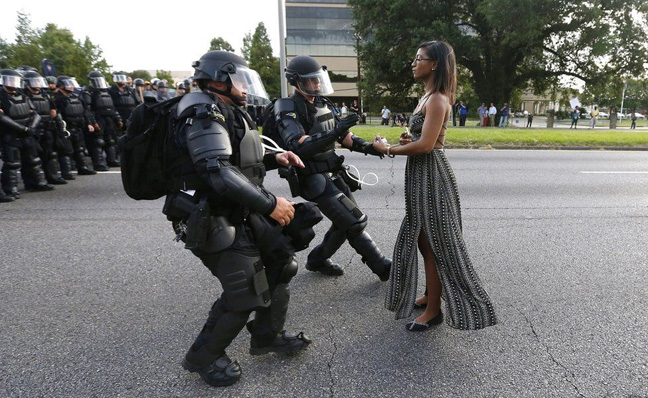 |
| 11 July 2016: Ieshia Evans stood before a line of policemen in riot gear near Baton Rouge police headquarters. Evans was one of 102 demonstrators later detained by the police, following the killings of Alton Sterling, Philando Castille and five police officers in Dallas. (Photo by Jonathan Bachman, Reuters) |
Yes, black and blue lives matter, and not just when they are lost
Two black men were killed by cops this month, just a day apart.
On July 5, near Baton Rouge, Louisiana, Alton Sterling was shot in the back while pinned down by two white officers. The next day, near St. Paul, Minnesota, Philando Castile was shot behind the wheel as his girlfriend and four-year-old daughter looked on from the passenger seats, having been pulled over because one of their car’s rear lights was not working.
Cell-phone videos of their final moments went viral, sending demonstrators back to the streets across the country. They have been doing so for the past two years and more, after seeing one African-American after another – Michael Brown, Eric Garner, Freddie Gray, among many others – dying at the hands of police officers, some of whom were either spared of indictment by a grand jury, or acquitted by a judge.
My immediate reaction was typical: Have they learned ANYTHING since Ferguson, Chicago, New York, Baltimore and so forth? Have all those protests, riots and promises of police reform made any difference? Does #Blacklivesmatter still, well, matter?
Micah Xavier Johnson, a black army reservist who once served in Afghanistan, felt the same anger and frustration as I did, but to a much greater extent. So much so, on July 7 in Dallas, Texas, he acted on those feelings.
That evening, towards the end of a peaceful demonstration, he opened fire at the police, killing five officers - Brent Thompson, Patrick Zamarripa, Michael Krol, Michael J. Smith, Lorne Ahrens - and wounding seven more, along with two civilians. Fulfilling his stated wish of killing white officers, the gunman withstood hours of standoff until the police ended his life with a robot bearing a payload of C4 explosives – the first time a human life was deliberately taken in such manner by domestic law enforcement.
Now, in these immediate days of shock and grief, we mourn and reflect. Some of us will also opine, and politicize these events. Those who do will lay blame where they can.
The left will hold the right accountable for blocking any meaningful measure to check the proliferation of firearms, until one of their own falls victim to gun violence – such as when Ronald Reagan and Jim Brady survived an assassination attempt in 1981. The right will accuse the left of salting the slow-healing wounds of America’s racial divide, just so that they may one day call for the repeal of the Second Amendment. Both sides will vociferously voice their support for the police officers who, along with firefighters and medics, work tirelessly as first responders to serve and protect the rest of us.
Either way, it is to absolve ourselves of our collective shame in habitually seeing this level of viciousness along the various fault lines in our communities, whether it is the fact that we are black or white, Christian or Muslim, gay or straight – or simply finding ourselves in a school, church, cinema, concert hall, airport or nightclub on a fateful night.
That is, until the next time another overreacting cop, home-grown terrorist or disgruntled psychopath pulls the trigger, and forces us to repeat this grievous exercise.-- CW, 8 July 2016
| Back to top |
